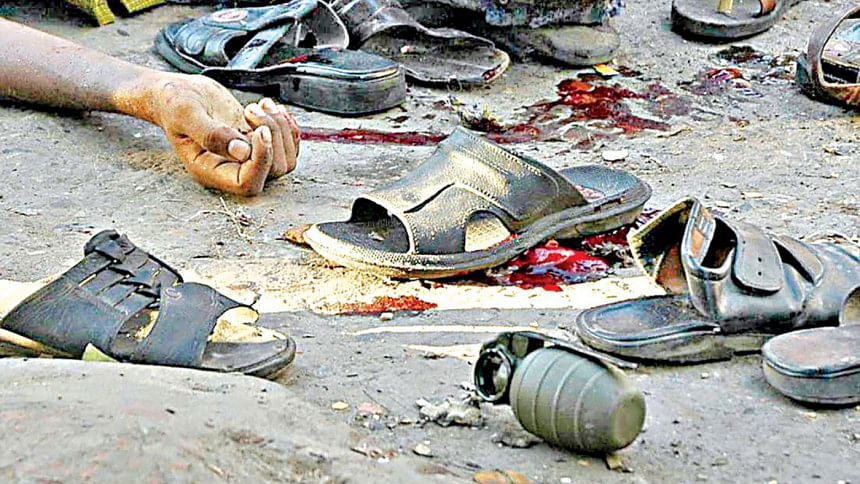The political fallout of August 21 grenade attack

After the fall of the Ershad government, signs of a democratic future emerged in Bangladesh in 1991. The two major political parties—AL and BNP—that came together in the anti-Ershad movement formed their separate coalitions (with smaller parties), and it appeared that Bangladesh would go down the line of a two-party parliamentarian/presidential system similar to the ones in the US, Japan and other countries.
For the next decade, the AL and BNP would alternate power, but after every election the losing party would go on to allege that the election was rigged. One important aspect of democracy, which is to admit defeat, still remained missing.
Instead of playing the role of the opposition in case of an electoral defeat, the two parties, from the very beginning, went on to adopt a boycott culture. The parliament became one-sided and ineffective while bitterness between the two parties intensified over time.
Not that there was any love lost between the AL and BNP before August 21, 2004. But the attack that was carried out on that day on an AL rally—which cannot be condemned enough—wiped all civility away from our politics which took a diabolical turn, involving a politically motivated assassination attempt. No longer was it just about coming to office to represent the people and, admittedly, having the many benefits that come with power, particularly in our country. For the two parties, it became a mortal combat.
In a way, the attack was an attempt to eradicate or prevent the AL from being the strong oppositional force that it was at the time. Had Sheikh Hasina been killed that day—as was the aim of the attackers—the AL would likely have fallen into utter turmoil from the chaos that would no doubt have followed.
Even before a special court in Dhaka delivered the verdict of the case on October 10, 2018—where BNP's acting chairman Tarique Rahman and 18 others were sentenced to life in prison, while former state minister for home Lutfozzaman Babar and 18 others were given the death penalty on charges of murder through criminal conspiracy—it was evident to the public that the attack had been sponsored by the then ruling party because of how the BNP-led government tried to bury any legitimate investigation into it. Moreover, there were strong suspicions among people that even state agencies were used to plan and coordinate the attack.
In the political arena, this created a situation where being the political opposition meant that you were not only going up against the ruling party, but the entire state machinery, in what was morphing into an all-or-nothing war. And once the stakes are so high, it becomes easier to justify coming to power using any and all means necessary.
Prior to August 21, 2004, the two parties had handed power over to each other relatively peacefully, albeit grudgingly, following elections that were comparatively free and fair (at least by our standards). Those elections were held under neutral governments. But afterwards, the provision to hold elections under a neutral government was removed from the constitution and politics became increasingly more confrontational and violent. As a result, the elections we have had since then have been far more questionable. And that has unmistakably taken a toll on our already fragile democracy.
Moreover, not only did the incident make our political waters far murkier, weaken our democratic institutions and damage our democracy, but it also polarised our society as a whole. Aside from being at each other's throats, the two parties also began to view neutral observers and other stakeholders as combatants in their battle for supremacy. Concerned citizens, independent media and all others who criticised either side became an enemy overnight. And the political intolerance we see today has arguably emerged as a direct consequence of that.
Today, despite being in a dominant position, the AL government continues to receive criticism for often clamping down on the dissenters. On the other hand, the BNP, it seems, is struggling to survive, with hundreds if not thousands of its workers and activists languishing in prison for years after being arrested. Meanwhile, the decline in democratic institutions, space and standards that we have witnessed since August 21, 2014, has pushed the general populace further and further away from politicians and political parties and has, in fact, discouraged most people from participating in our political process altogether.
We are now in a situation where there is no legitimate opposition to the ruling party. And our democracy, which has never been perfect, is at a crossroads—with the events of August 21, 2014 playing a major role in getting us here.
Eresh Omar Jamal is a member of the editorial team at The Daily Star.
His Twitter handle is: @EreshOmarJamal

 For all latest news, follow The Daily Star's Google News channel.
For all latest news, follow The Daily Star's Google News channel. 



Comments